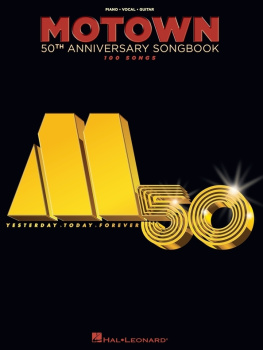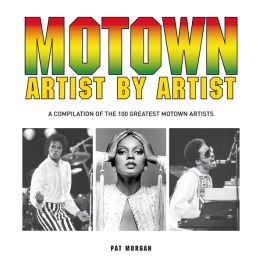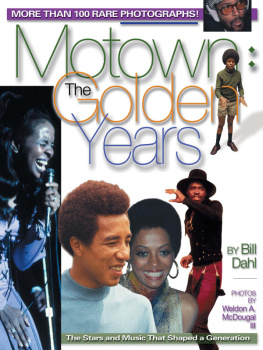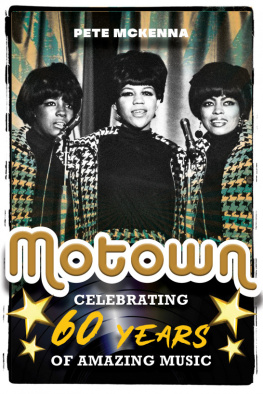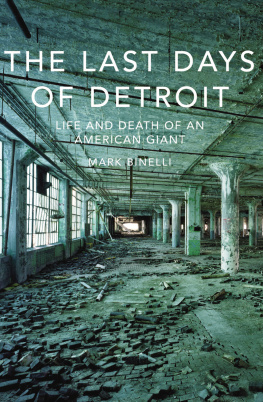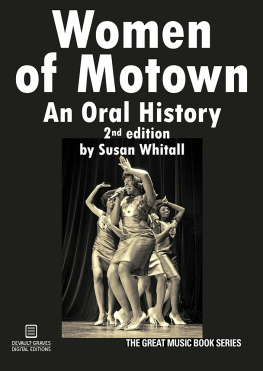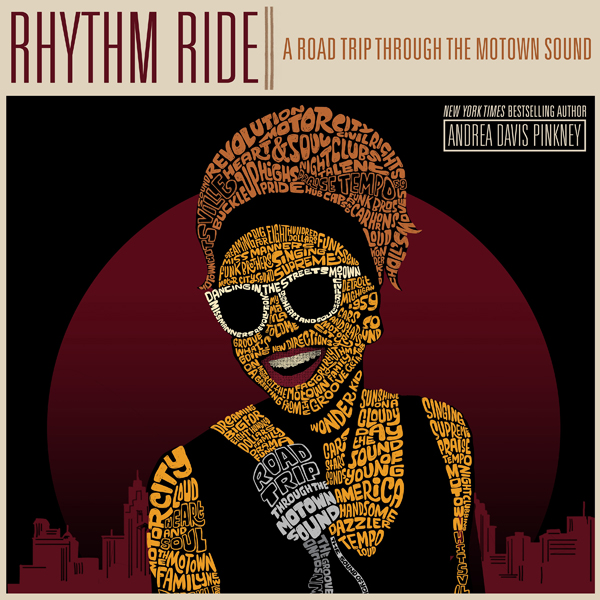Contents
Guide


The author and publisher have provided this e-book to you for your personal use only. You may not make this e-book publicly available in any way. Copyright infringement is against the law. If you believe the copy of this e-book you are reading infringes on the authors copyright, please notify the publisher at: us.macmillanusa.com/piracy.
For Amy

Whenever Smokey Robinson, third from left, and his group, the Miracles, sang, they invited fans to come along on a musical journey.
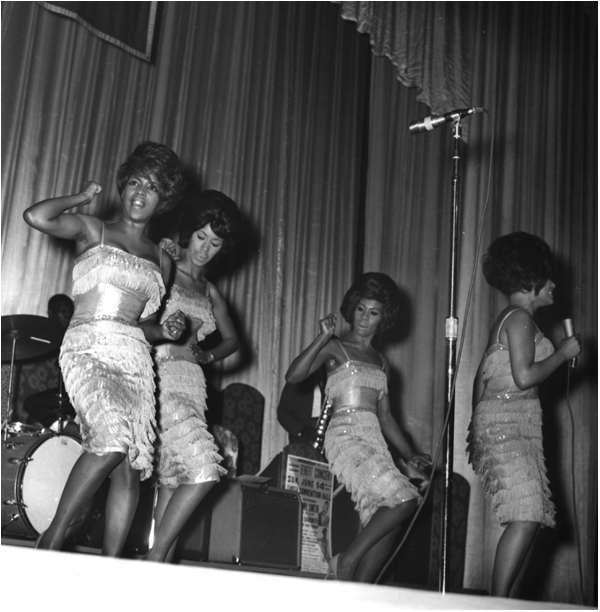
The Marvelettes shook it up good every time they graced a stage.
Every day I watched how a bare metal frame, rolling down the line would come off the other end, a spanking brand new car. Maybe, I could do the same thing with my music. Create a place where a kid off the street could walk in one door, an unknown and come out another door, a star.
Berry Gordy, Jr., Motown founder
We did not set out to make black music. We set out to make quality music that everyone could enjoy and listen to.
Smokey Robinson, singer-songwriter
It was bigger than we thought it was gonna be We could make the ants dance.
Joe Hunter, band director, the Funk Brothers
Gordy had found the magic formula for crossover.
Dick Clark, television host
They were songs to dance to. March to. Fly to Music, pure and simple Full of promise and determination, unity and humanity.
Marvin Gaye, musician, recording artist
YOU READY, CHILD? LETS GO.
Ive got my pulse on all the roads. And side streets. And avenues. And alleyways.
You see, I steer the beat. Thats why they call me the Groove.
Because my uh-huh keeps us pumping on the way. So uh-huh , Im the one driving this Rhythm Ride. Make no mistake, kid. Im not a man or a woman. Im a guide . A tempo that keeps us on track.
Hey, put that road map away. We dont need it. I know this highway. Im clear on where Im goingand I sure know where Ive been. When youve lasted as long as I have, you learn that yesterday sets the path to today. Our past shows us where weve come from and where were heading. The truth of it is, the Groove has been at the wheel for the whole time. Thats why nobody can run me off the road. Im here to stay. And now, Id like to take you on a drive.
Yeah, you. Sitting pretty. Taking in the whole view from your window.
Make sure you stay alert, cause this Rhythm Ride is a tripand a story about cars and stars, and a sound. Its the journey of one mans dream. That man, Berry Gordy, Jr., was an unstoppable originator. This is the true tale of how he took kids from the street and turned them into celebrities. Our drive follows Berrys vision-come-to-life. Honey, youre about to see how Berrys company put pride on the flip side of prejudice, and came to be called the Sound of Young America.
As we get ready to roll, you need to know something about the Groove. Im blacker than midnight. And proud of it.
Ive been pumped, sung, shunned, loved, let loose, danced to, segregated, and celebrated. Ive driven to the beat and through it.
Ive been called some names, too. Some good namespraise tempo and heart-and-soul harmony.
And other names that put some painful scratches on my shiny black vinylnames like race music and darkie sounds.
Yeah, Ive seen good days and bad.
Highs.
Lows.
In-betweens.
But Im tough. Ive got grit, deep down. I dont ever give up. Ive stood the test of time.
Sweetie, before we get started, I need to warn you. There are happy places along this road and sad ones, too. Every time I take a kid on this ride, they come home changed. Different. Rhythm has a way of doing that. It stirs you up, then sets you down on higher ground.
You think you can handle it? Good .
Stick with the Groove.
Here we go.
On a Rhythm Ride.
To a place.
Called Motown.
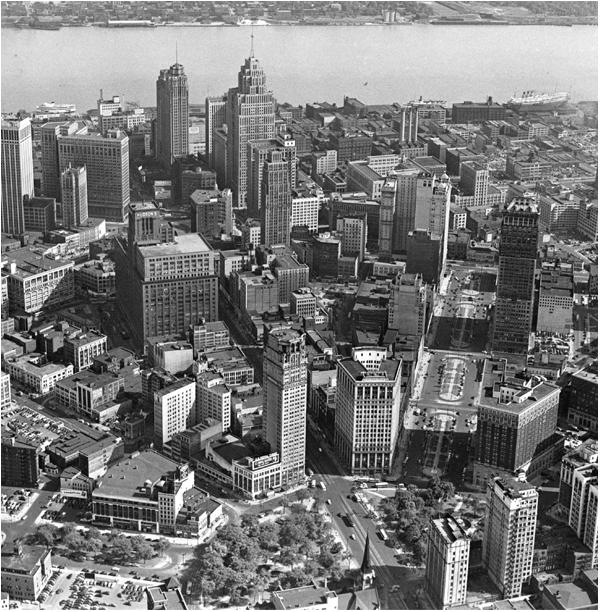
Detroit was an industrial city that attracted African American workers from the South who came to the North in search of jobs. As one of the worlds largest automotive centers, Detroit offered opportunities for joining the ranks of men and women employed in what some called the car capital.
BUCKLE UP, BABY. SETTLE IN.
Our trip begins with Berry Gordy, Jr., a kid who always kept his motor running. Berry lived with his family in Detroit, Michigan. In the late 1920s, when he was born, Detroit was a boomtown for African Americans. The Motor City was what folks called the sidewalks and streets that wove together their community. Detroits pulse got its beat from the Ford Motor Company, the automotive industrys biggest employer of black men and women, and the only company that had come to an agreement with the United Auto Workers that prohibited discrimination based on race or skin color.
When someone new came to town, they immediately went to Ford to get a job. If a child was born in Detroit, people joked that the baby bounced from Henry Ford Hospital to the Ford Motor Company assembly belt, where he or she would spend the rest of his or her days shaping fenders, tweaking headlights, or slapping car doors onto hot-off-the-line Model 59s.
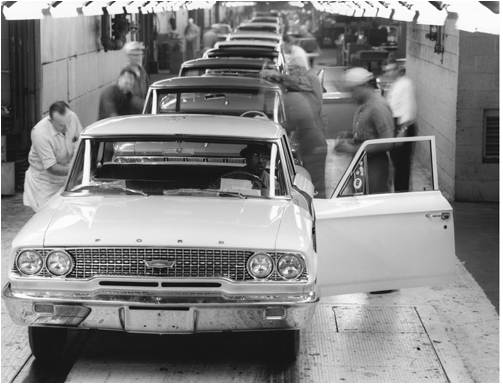
The Ford Motor Company provided jobs to anyone willing to spend long hours on an assembly line building cars from the wheels up. The work was boring, but provided decent wages. African Americans and white people often worked side by side putting together car parts, though in some towns they were segregated.
Ford paid higher salaries than any other automotive company. At Ford, workers had the widest range of job opportunities. You could start as a welder and work your way up to foreman. There were many who took great pride in working at Ford and liked the camaraderie found on the assembly line.
But being employed by Ford wasnt all sparkling hubcaps and happy car horns. For some, making cars could be grueling. From morning to night, workers spent hours doing the same tasks again and again, with only two fifteen-minute breaks a day.
It went like this:
Stand snatch bend attach
Stand snatch bend attach
Also, the place was loud. It smelled like sweat and chrome polish. The bright lights made it hot. If you were lucky enough to be stationed near one of the small windows, there was no time to take even a quick look outside. For many folks, the paycheck made the long days and stale air bearable. But for others, it was tedious grunt work, not worth the money.
Berrys parents, Berry Gordy, Sr., and Bertha, owned a few successful businesses, which meant they didnt have to work for Ford. They were entrepreneurs who took pride in running their family establishments, and they taught their children the value of hard work.


